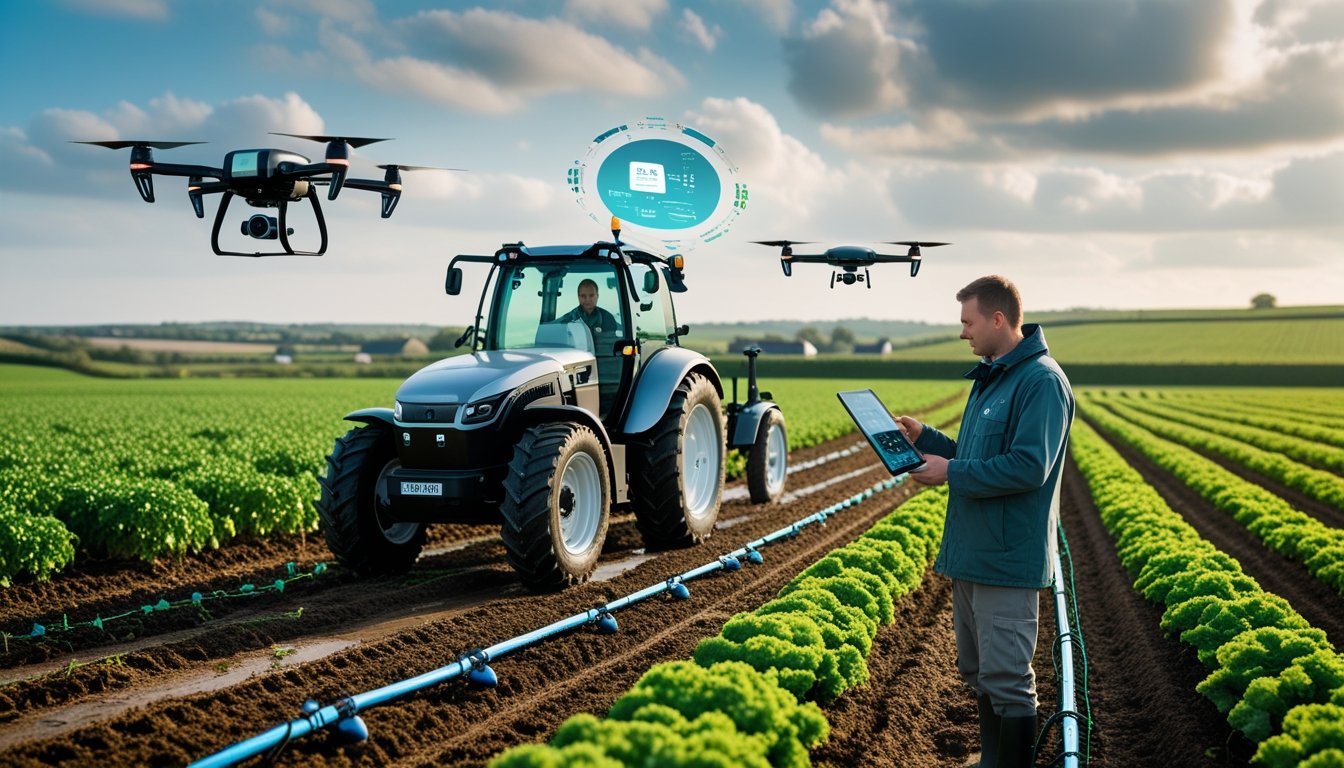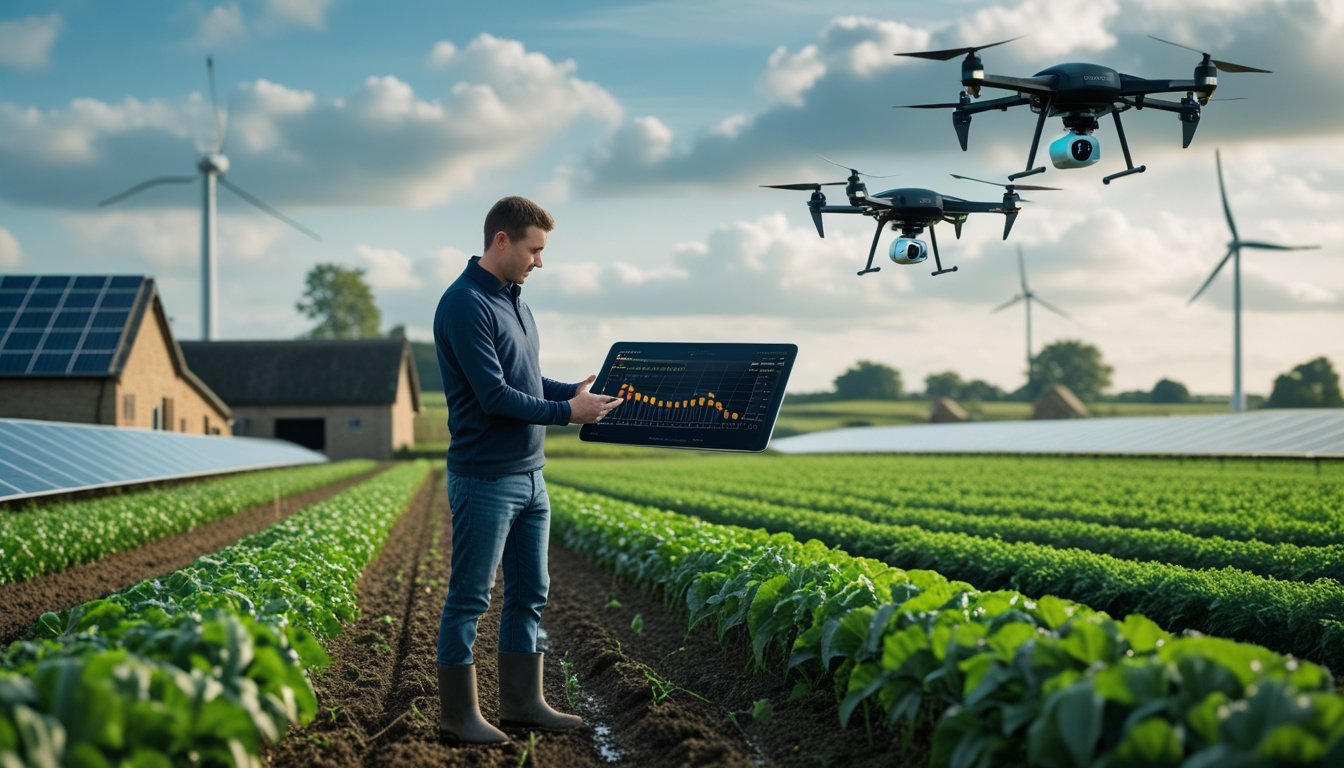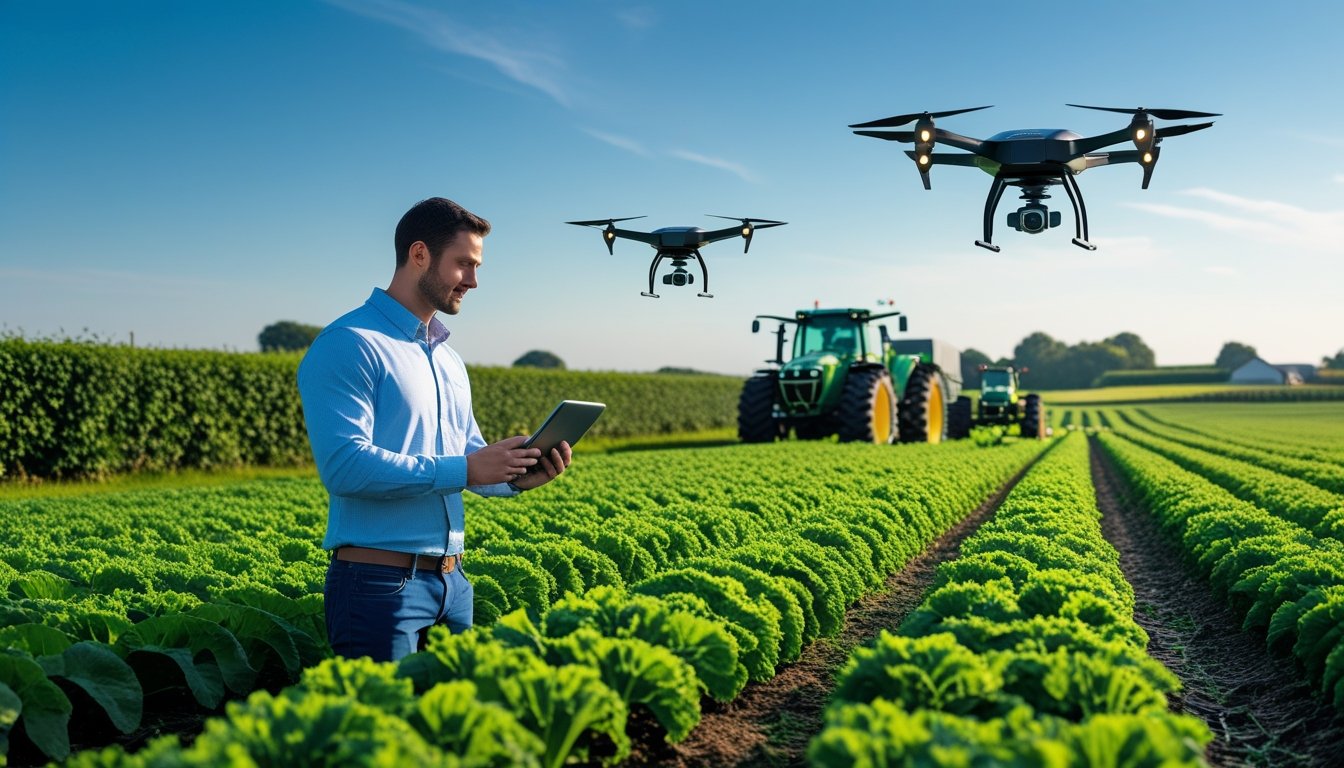Late updated: 15 Oct 2025 15:10
Written by: Oliver Bennett
AI Innovations in UK Countryside Agriculture Practices: Transforming Rural Farming
Artificial intelligence is making waves across industries, and agriculture in the UK countryside is no exception. As AI technologies evolve, they are becoming key drivers of change, enhancing productivity and sustainability. AI applications such as machine learning and data analytics are reshaping how farms run, from improving crop yields to optimising resource use.

The integration of AI into rural farming is not just about increased efficiency. It represents a significant shift in traditional practices. Farmers are turning to smart technologies to tackle issues like labour shortages and environmental challenges, enabling them to make informed, data-driven decisions. Our countryside is witnessing a transformation, paving the way for a future where agriculture is both sustainable and technologically advanced.
As we explore these innovations, we see AI's potential in areas like predictive algorithms and smart farming tools. These advancements are helping farmers adapt to climate change by allowing more precise farming methods. We are at the forefront of an agricultural revolution, creating opportunities for a new era of farming practices.
Key Takeaways
- AI transforms UK agriculture with advanced tech solutions.
- Smart technologies address sustainability and resource use.
- Innovative AI tools aid farmers in adapting to change.
AI Innovations Shaping UK Countryside Agriculture
Artificial intelligence is fundamentally changing how agriculture is practised in the UK countryside. Through precision agriculture, advanced data analytics, and the use of autonomous machinery, farmers are seeing enhanced productivity and sustainability. These technologies provide targeted solutions that drive efficiency, conserve resources, and improve crop yields.
Precision Agriculture and Data-Driven Farming
Precision agriculture utilises AI technologies to optimise farming practices by collecting and analysing detailed data. By leveraging satellite imagery and sensors, we can monitor soil conditions and weather patterns in real-time. Machine learning algorithms then help us make informed decisions about planting dates, fertilisation strategies, and irrigation schedules to maximise crop yields. This data-driven approach not only boosts productivity but also reduces waste and conserves resources.
This method supports sustainable farming practices by ensuring resources like water and fertilisers are used efficiently. Predictive analytics allows us to anticipate potential issues, such as pest infestations, and take corrective measures promptly. By focusing on precise data, precision agriculture helps us achieve greater sustainability and efficiency in the UK countryside.
AI-Powered Crop Monitoring and Management
AI-powered crop monitoring offers us the tools needed to maintain optimal field conditions. By using AI-driven technologies, we can continuously assess plant health and detect signs of disease or nutrient deficiencies. The integration of AI in crop management facilitates more frequent and accurate field assessments, guiding timely interventions.
Through predictive analytics, we anticipate and mitigate challenges like crop stress and fluctuations in market demand. This tech unlocks a deeper understanding of crop development stages and their specific requirements, helping maintain health and maximise yields. As a result, AI technologies empower us to enhance production while maintaining the ecological balance in rural landscapes.
Autonomous Machinery: Tractors, Robots, and Drones
Autonomous machinery is transforming the countryside with autonomous tractors, robots, and drones. These innovations allow us to perform tasks like planting, watering, and harvesting with unprecedented precision. Robots equipped with AI capabilities can manage specific farm tasks repetitively without fatigue, boosting productivity.
Drones offer an aerial vantage point through advanced imaging technology, capturing detailed data over large farm areas. This capability enables rapid assessments and the immediate execution of tasks, reducing manual labour and improving accuracy. The integration of autonomous machinery not only enhances productivity but also future-proofs our farming practices against labour shortages and environmental uncertainties.
AI-Enabled Sustainability and Resource Optimisation in Rural Farming

Integrating AI into rural farming empowers us to use resources more efficiently, manage land sustainably, and maintain high productivity levels. By implementing advanced technologies, we support UK farmers in creating resilient agricultural practices that address climate challenges.
Fertiliser Application and Soil Health Management
Precision in fertiliser application is crucial for enhancing soil health and boosting crop yields while minimising environmental impacts. AI systems help in accurately estimating the needs of the soil by analysing data from various sources such as soil sensors and satellite imagery. This enables farmers to apply fertilisers in optimal quantities, promoting sustainable farming practices.
Our approach focuses on preventing nutrient leaching and soil degradation. By adopting AI-driven solutions, farmers reduce the overuse of fertilisers, aiding in the conservation of local ecosystems. Additionally, AI tools can predict soil depletions and recommend amendments, ensuring soil vitality and productivity over the long term.
Weather Pattern Forecasting for Rural Farms
Understanding and adapting to weather patterns is essential for rural farmers, especially in the UK where weather is unpredictable. AI technologies analyse historical weather data alongside real-time data to forecast future conditions with greater accuracy. This assists farmers in making informed decisions about planting, irrigating, and harvesting their crops.
By adopting these forecasting tools, farmers can mitigate risks associated with adverse weather events. This not only improves yield prediction but also minimises resource wastage and financial losses. Enhanced forecasting allows us to adapt to climate volatility, supporting sustainable growth in the agricultural sector.
AI-Driven Livestock and Animal Welfare Systems
AI advancements provide significant improvements in livestock management and animal welfare. AI systems monitor animal health through sensors and cameras, giving farmers the ability to identify and address health issues before they escalate. This real-time surveillance enhances the well-being of livestock, leading to better productivity and output.
We utilise specific AI tools to track behavioural patterns, feeding habits, and environmental conditions. This ensures optimal conditions for livestock, improving both their welfare and the economic outcomes for farmers. Such systems represent a critical step towards more ethical and sustainable livestock farming practices in the UK.
Frequently Asked Questions

In this section, we explore various ways artificial intelligence is reshaping agricultural practices in the UK countryside. We delve into the specifics of how technology enhances efficiency, productivity, and sustainability in farming.
How are autonomous tractors transforming the UK's agricultural landscape?
Autonomous tractors are becoming a critical asset in UK farming by reducing labour demands and increasing precision in fieldwork. These machines use AI to navigate fields, improving ploughing, planting, and harvesting efficiency. Their ability to operate without human intervention allows farmers to manage larger areas with fewer resources.
What impact does artificial intelligence have on precision farming techniques?
Precision farming in the UK benefits significantly from AI, which enhances data analysis and decision-making abilities. AI algorithms help in predicting weather patterns, analysing soil health, and optimising fertiliser use. This leads to more accurate applications, reducing waste and improving crop yields consistently.
In what ways are AI-powered systems enhancing livestock management?
AI-powered systems support UK farmers by monitoring livestock health through video and biometric analysis. These technologies detect behavioural changes and potential health issues early, allowing timely interventions. AI systems also optimise feeding schedules and improve overall herd management.
How are UK farmers integrating drone technology to improve crop monitoring?
Drones equipped with AI capabilities are revolutionising crop monitoring in the UK. They capture detailed aerial images and use AI for real-time data analysis. This assists farmers in identifying pest infestations, assessing crop health, and planning precise interventions, saving both time and resources.
Can AI contribute to sustainable farming practices in the UK countryside?
AI facilitates sustainable farming by optimising resource use and minimising environmental impact. Through precision farming, AI reduces the need for excessive chemicals and water, promoting biodiversity. It also aids in managing soil health and carbon footprint, supporting the UK's sustainability goals.
What are the challenges and opportunities for AI deployment in rural agricultural areas?
While AI offers significant benefits, its deployment in rural UK areas faces challenges such as connectivity issues and the need for technical skills. However, these challenges present opportunities for investment in infrastructure and education. Addressing these barriers can unlock AI's full potential in transforming rural agriculture.
